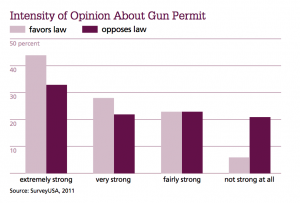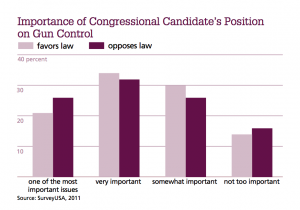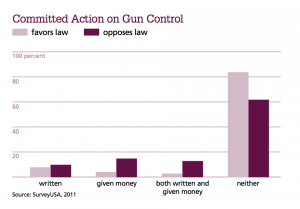The Gun Control Paradox
The massacre of 26 people in a Connecticut school, most of them young children, led to renewed calls for legislation to provide better control of guns. Even though mass shootings occur on a regular basis—6 dead in the Gabrielle Giffords shooting in Arizona, 7 dead at a Sikh temple in Wisconsin, 12 dead in a movie theater in Colorado—little legislative change occurs. Historically, despite considerable public outcry immediately following these horrific events, attention to gun control quickly fades. Yet according to the widely respected General Social Survey (GSS), support for requiring a police permit to buy a gun remains greater than opposition to it by three to one. Given this support for greater control, and the repeated occurrence of gun-related massacres, the lack of legislative
change calls for closer examination.
Since the GSS began in 1972, the question of requiring a police permit has been asked 25 times, with support for requiring a permit never dipping below 70 percent. Other reasonable steps to reduce the spread of the most destructive weapons would quite likely garner wide public agreement. Why is it that public opinion has so little effect on the issue of requiring police permits for buying a gun? There are some social issues for which opponents express much greater intensity of feeling than proponents, for example, legalized abortion, and that helps explain the difficulties of legislative action. But this is not the case in studies of the police permit issue. In a recent study arranged by the first author, the use of three different measures of strength of opinion provided a clear interpretation of why it is so difficult to pass legislation on the control of guns.
Our survey was carried out in 2011 by SurveyUSA, a reputable polling firm with a strong record for accuracy of election predictions. We first asked a question that gauged the level of support for legislation: “Would you favor a law which would require a person to obtain a police permit before they could buy a gun, or do you think such a law would interfere too much with the right of citizens to own guns?” The results showed that 57 percent favored a gun permit requirement, and 43 percent were in opposition. This is lower than the 74 percent who favored requiring a permit in the 2010 General Social Survey, but phrasing of the question and survey administration could account for the difference. At 57 percent, a clear majority of the public continues to support the requirement of police permits.
Strength of Opinion Versus Strength of Action
We also included three different measures of “strength of opinion.” Considered together, the responses provide an explanation for why such a requirement—as well as other gun restrictions— has so much difficulty becoming law.
 First, “intensity of opinion” was measured immediately after asking for pro- and anti- attitudes on police permits: “Compared with how you feel on other public issues, [how strong] are your feelings about permits for guns?” As the results show, those favoring a law requiring police permits claim to feel more strongly than do opponents. So far, the supporters of gun permits seem to have the upper hand: there are more of them, and their feelings on the issue seem stronger.
First, “intensity of opinion” was measured immediately after asking for pro- and anti- attitudes on police permits: “Compared with how you feel on other public issues, [how strong] are your feelings about permits for guns?” As the results show, those favoring a law requiring police permits claim to feel more strongly than do opponents. So far, the supporters of gun permits seem to have the upper hand: there are more of them, and their feelings on the issue seem stronger.
 The next measure of opinion strength, “centrality of opinion,” connects the gun permit law to likely voting by respondents: “How important is a candidate’s position on permits for guns when you decide how to vote in a Congressional election?” When strength is measured by voting behavior, rather than by subjective feelings, the difference is in the opposite direction. Those opposing a gun permit law show a greater propensity to allow their attitude to influence their vote. This calls to mind the popular bumper sticker slogan: “I am a gun owner, and I vote.” However, we must keep in mind that this question, although explicitly connecting an attitude with a behavior, remains hypothetical.
The next measure of opinion strength, “centrality of opinion,” connects the gun permit law to likely voting by respondents: “How important is a candidate’s position on permits for guns when you decide how to vote in a Congressional election?” When strength is measured by voting behavior, rather than by subjective feelings, the difference is in the opposite direction. Those opposing a gun permit law show a greater propensity to allow their attitude to influence their vote. This calls to mind the popular bumper sticker slogan: “I am a gun owner, and I vote.” However, we must keep in mind that this question, although explicitly connecting an attitude with a behavior, remains hypothetical.
 Finally, a question about what we call “committed action” cuts to the chase by asking what respondents have actually done on the gun permit issue: “Have you ever written a letter or sent an email to a public official expressing your views on gun permits or given money to an organization concerned with this issue?”
Finally, a question about what we call “committed action” cuts to the chase by asking what respondents have actually done on the gun permit issue: “Have you ever written a letter or sent an email to a public official expressing your views on gun permits or given money to an organization concerned with this issue?”
Of those opposed to the gun permit requirement, a higher number reported having given money or written a letter or sent an email message to a public official, compared to such actions by supporters of gun permits. Moreover, if we consider those who have both given money and written messages—the most active activists—13 percent of the opponents of gun permits, but just 3 percent of the proponents, say they have done both.
Whatever may be the case at the level of subjective feelings, past actions reported by Americans—and quite likely mobilization for future action if contacted by an organization like the National Rifle Association—are clearly on the side of opponents of a gun permit law. According to further survey results, the NRA has a distinct ability to mobilize its constituents. Of those opponents who had both given money and written, 34 percent report being members of the NRA. In contrast among those opponents who had not done both activities, only 4 percent were NRA members.
Legislators, at the national and state level, experience much greater pressure from Americans opposed to greater control of guns than from those who favor more control. Quite likely the same holds for any other law restricting gun purchases. This goes a long way toward explaining the failure of legislatures to pass laws that a clear majority of the public would support. At our suggestion, the Pew Poll incorporated our follow-up questions in a January 2013 survey and replicated the results we report here, which were themselves a successful replication of our results from some 35 years ago!
There is more than one way to measure the strength of opinion of two sides on an issue like gun permits. Too often, polls merely ask a single “for or against” question on this divisive issue. However, our survey results imply that it is actual behavior that has a major influence on an outcome when political action is at stake.
Consequently, if proponents of gun control legislation want to succeed, they must counter their opponents with letter writing campaigns of their own, with financial support for appropriate organizations, and with protests, showing that they are committed enough to act on the issue.
